Table of Contents
The Giving Tree
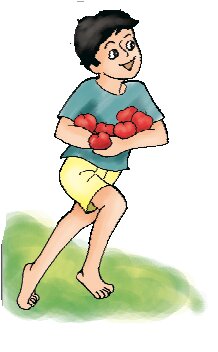
How do you feel when you help someone?
How do you feel when you share your things with others?
Read this play to know how a tree feels when it helps a boy.
Narrator: Once there was a tree and it loved a little boy. Every day the boy would visit the tree and enjoy its company.
Tree: Come here, my boy. Come and climb up my trunk and swing from my branches.
Boy: (swinging from branches) Ah, what fun!
Tree: Are you hungry? Eat my apples.
Boy: (eating apples) How delicious!
Narrator: When the boy was tired, he slept under the tree. The tree was happy to give its shade. But time went by.
And the boy grew older and went away.
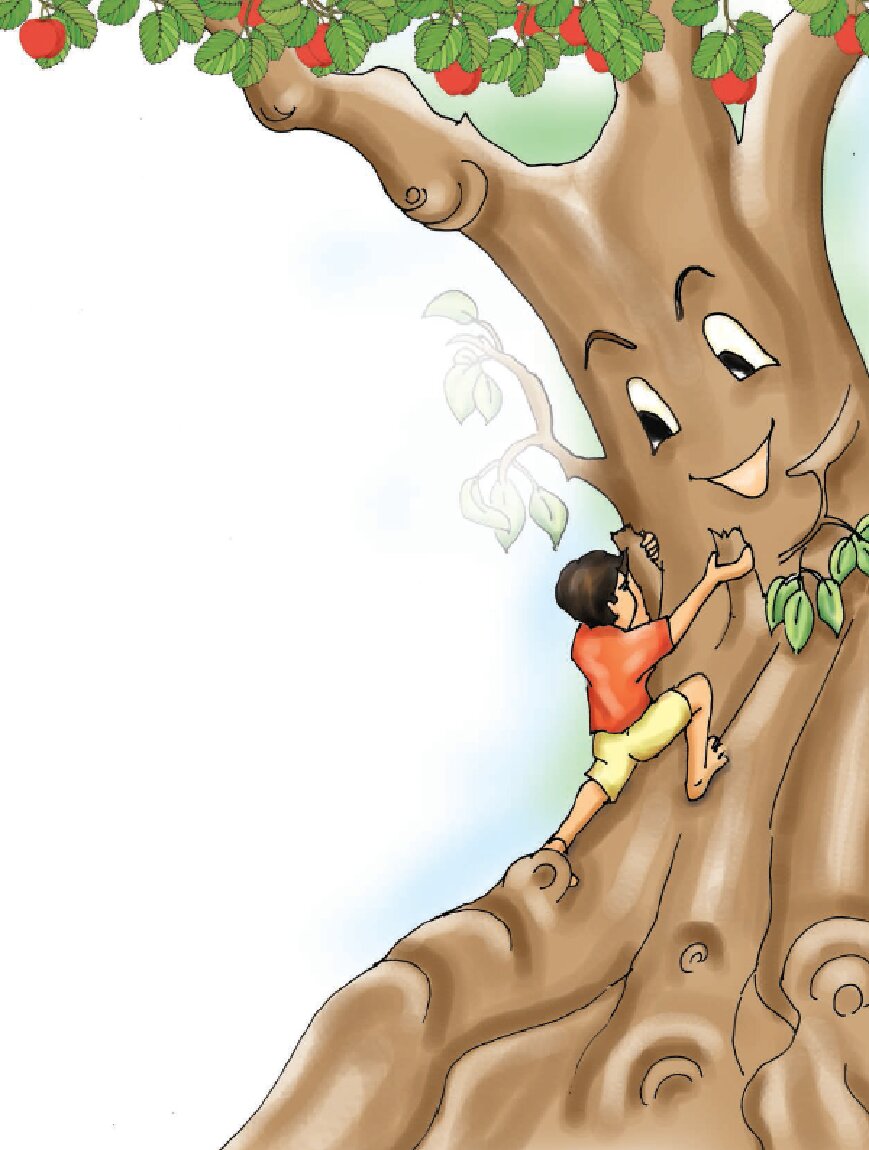
The tree was often alone. After some years... One day the boy came to the tree and the tree was very happy.
Tree: Come, my boy, come and climb up my trunk and swing from my branches.
Boy: I am too big to climb and play. I want to buy things and have fun. I want some money. Can you give me some money?
Tree: I’m sorry but I have no money. I have only leaves and apples. You can pluck my apples and sell them in the market. Then you will have money.
Narrator: The boy happily plucked the apples and carried them away. The tree was also happy. But the boy stayed away for a long time and the tree was sad. One day, the boy came back and the tree shook with joy.
Tree: Come, Boy, come and climb up my trunk. Swing from my branches, eat my apples, play in my shade and be happy.
Boy: I am too busy to climb trees. I am getting married and I need a house for my wife and children. Can you give me a house?
Tree: I have no house but you may cut off my branches and build a house.
Narrator: So the boy cut off the tree’s branches and carried them away to build a house.
The tree was very happy.
But the boy stayed away for a long time and the tree was sad again.
And when he came back after some years, the tree was so happy that it could hardly speak. Now, the boy was a young man.
Tree: Come, Boy, come. What can I do for you?
Young man: I am going on a business trip. I want a boat to take me away. Can you give me a boat?
Tree: All I have left is a trunk. Cut down my trunk and make a boat. Then you can sail away.
Narrator: The young man cut the trunk of the tree and sailed away in a boat. The tree was left only with a stump.
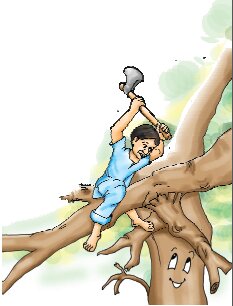
And after a long time the young man came back again. Now he was an old man but the tree recognised him.
Tree: I am sorry, friend, but I have nothing left to give you. My apples are gone.
Old man: My teeth are too weak for apples.
Tree: My branches are gone. You cannot swing on them.
Old man: I am too old to swing on branches.
Tree: My trunk is gone. You cannot climb.
Old man: I am too tired to climb.
Tree: (sighing) I am sorry. I wish that I could give you something… but I have nothing left. I am just an old stump. I am sorry…
Old man: Dear tree, you have always given. But now I don’t need much— just a quiet place to sit and rest.
Tree: (happily) Well, an old stump is good for sitting and resting on. Come, friend, sit down and rest.
Narrator: The old man did.
And the tree was still happy.
Adapted from – ‘The Giving Tree’ by Shel Silverstein
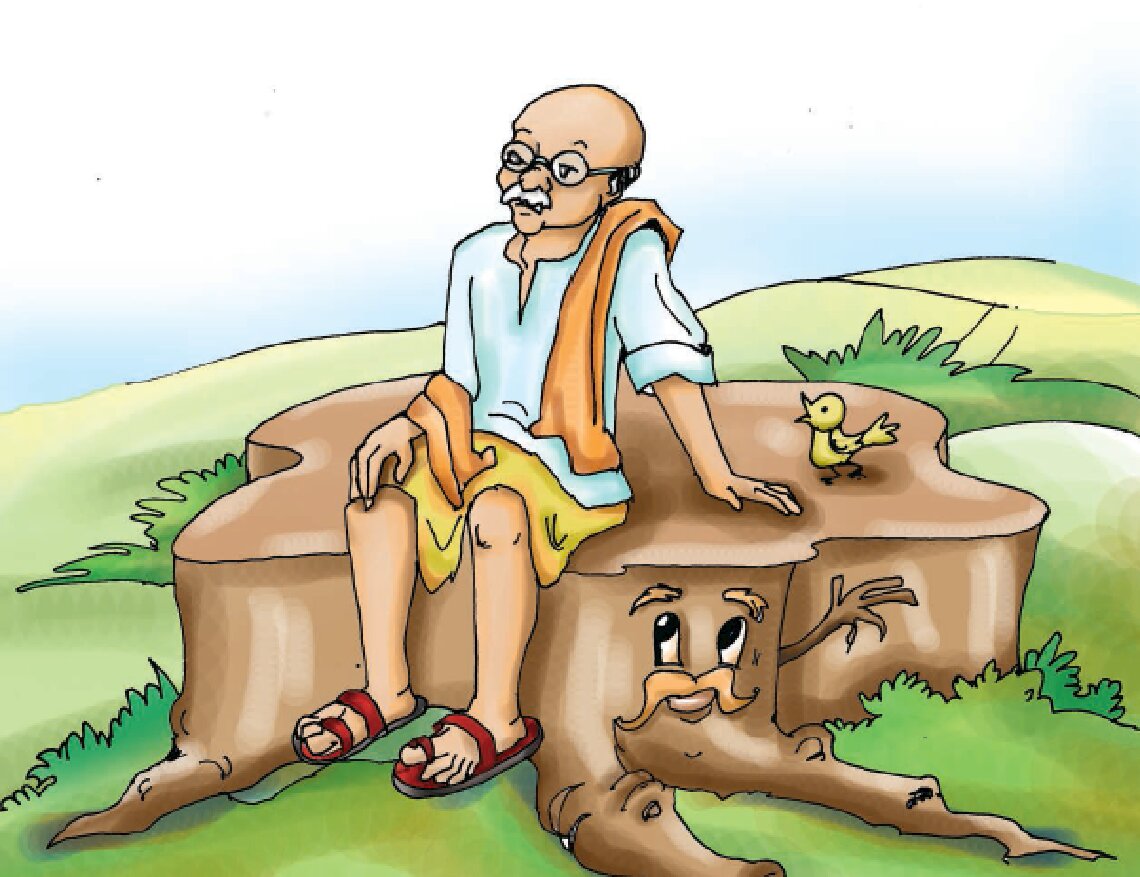
New words
swing, delicious, pluck, trip, sail, stump, recognised
Reading is fun
1. How did the boy enjoy the company of the tree?
2. How did the tree help the boy earn money?
3. What did the boy make with the branches of the tree?
4. What did the boy make with the trunk of the tree?
5. How was the stump of the tree useful?
6. Why is the play called ‘The Giving Tree’?
Word building
1. Make new words and complete the sentences.
(a) The children love to sing _____. (loud)
(b) Read your lesson _____. (silent)
(c) Throw the ball _____. (slow)
(d) The tree gave its fruit to the boy _____. (happy)
2. Fill in the blanks with the correct word.
My mother went to the market and bought a kilogram of _____ (apple / apples), a dozen _____ (banana / bananas) and a dozen _____ (orange/ oranges). I love oranges. So I ate an _____ (orange/oranges). My brother wanted a _____ (banana / bananas) and my sister asked for an _____ (apple / apples). A tree has one _____ (trunk / trunks) but many _____ (branch / branches). A _____ (branch / branches) has a number of _____ (leaf / leaves) and _____ (flower / flowers).
Let’s talk
1. Why should we not cut trees?
2. At the end of the play, only the stump of the tree is left. Find out if it will grow into a tree again.
3. Say the given sentences with different expressions.
(a) Come and play with me.
(b) I want to buy things and have fun.
(c) Come and climb up my trunk and swing from my branches.
(d) Cut down my trunk.
(e) I am too old to swing on branches.
(f) I am too tired to climb.
1. Write these sentences in the correct order. Also, choose the right word from the box and add it before each sentence. Remember to put a comma after it, for example, Finally, ...
First Then After that finally
(a) It gave him its branches to make a house.
(b) It asked him to sit on the stump.
(c) It gave him its trunk to make a boat.
(d) The tree gave its apples to the boy.
2. Work in a group and decide the things that you can do to help your grandparents or any old person.
Now, write five of these things that you will do.
_____ _____ _____ _____ _____
Let’s act
1. You are reading and talking about trees. You are thinking about trees too.
Can you make the shape of a tree with your body?
(a) Let’s see your branches.
(b) Let’s see a full tree with fruits and leaves.
(c) Enact a cut tree with only a trunk.
(d) Enact a tree with only a stump left.
(e) Communicate the idea in this play.
2. Use your body to –
stretch, bend, jump, twist, hop, climb
Let’s read
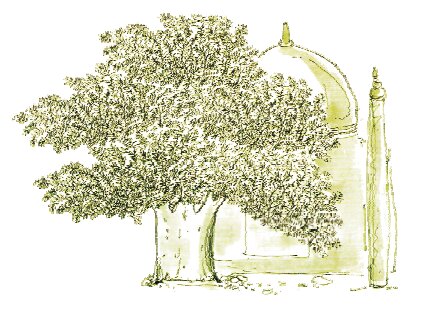
Chintha Chettu is a tamarind tree.
This famous tamarind tree is in Gwalior.
It grows over Tansen’s tomb.
Tansen was a great singer.
People in Gwalior say:
“Eat the leaves of this tamarind tree
And you’ll also sing like Tansen!”
Choose the right words.
1. Chintha Chettu is a tamarind _____ (tree / leaf).
2. This famous tree is in _____ (Guntur / Gwalior).
3. Tansen was a famous _____ (singer / dancer).
4. The tamarind tree grows over Tansen’s _____ (house / tomb).
5. “Eat the leaves of the tamarind tree, and you’ll also sing like _____ (Tansen / Akbar).”
Read and enjoy this poem